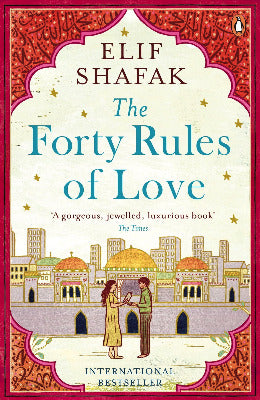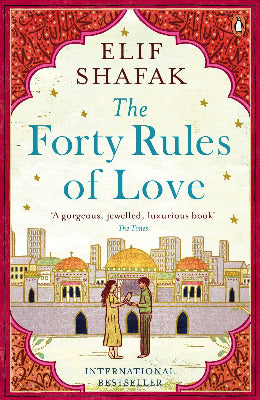The Forty Rules of Love by Elif Shafak
The Forty Rules of Love by Elif Shafak
The Forty Rules of Love
Forty-year-old Ella Rubenstein is an ordinary unhappy housewife with three children and an unfaithful husband, but her life begins to change dramatically when she takes a job as a reader for a literary agency. Her first assignment is a novel intriguingly titled Sweet Blasphemy, about the thirteenth-century poet Rumi and his beloved Sufi teacher Shams of Tabriz. The author is an unknown first-time novelist, Aziz Zahara, who lives in Turkey. Initially reluctant to take on a book about a time and place so different from her own, Ella soon finds herself captivated both by the novel and the man who wrote it, with whom she begins an e-mail flirtation. As she reads, she begins to question the many ways she has settled for a conventional life devoid of passion and real love.
At the center of the novel that Ella is reading is the remarkable, wandering, whirling dervish Shams of Tabriz, a mystic provocateur who challenges conventional wisdom and social and religious prejudice wherever he encounters it. He is searching for the spiritual companion he is destined to teach. His soul’s purpose is to transform his student, Rumi—a beloved but rather complacent, unmystical preacher—into one of the world’s great poets, the “voice of love.” Rumi is a willing student, but his family and community resent Shams deeply for upsetting their settled way of life. Rumi is admired, even revered in his community and Shams must lead him beyond the comforts of his respectable way of life, beyond the shallow satisfactions of the ego.
In essence, both Rumi and Ella, through their relationships with Shams and Aziz, are forced to question and then abandon the apparent safety and security of their lives for the uncertainty, ecstasy, and heartbreak of love. Neither Shams nor Aziz can offer anything like a promise of lasting happiness. What they can offer is a taste of mystical union, divine love, the deep harmony that arises when the false self—constructed to meet society’s demands for respectability—is shed and the true self emerges.
Along the way, Shams imparts the forty rules of love, essential Sufi wisdom that Shams both preaches and embodies. He repeatedly defies social and religious conventions, putting himself in danger and drawing down the scorn and wrath of the self-righteous, literal-minded moralists who surround him. He inspires Rumi to become the poet he was meant to be, one of the world’s most passionate and profound voices of wisdom. Similarly, Aziz—and his story of Rumi and Shams—inspires Ella to step out of a marriage that has become emotionally and spiritually stifling for her.
It is not an easy story that Elif Shafak tells, nor an entirely happy one. There are costs, she seems to say, to living an authentic life. But, as the novel shows, the costs of not living one are far greater.
Product features
Product features
Materials and care
Materials and care
Merchandising tips
Merchandising tips
Share


